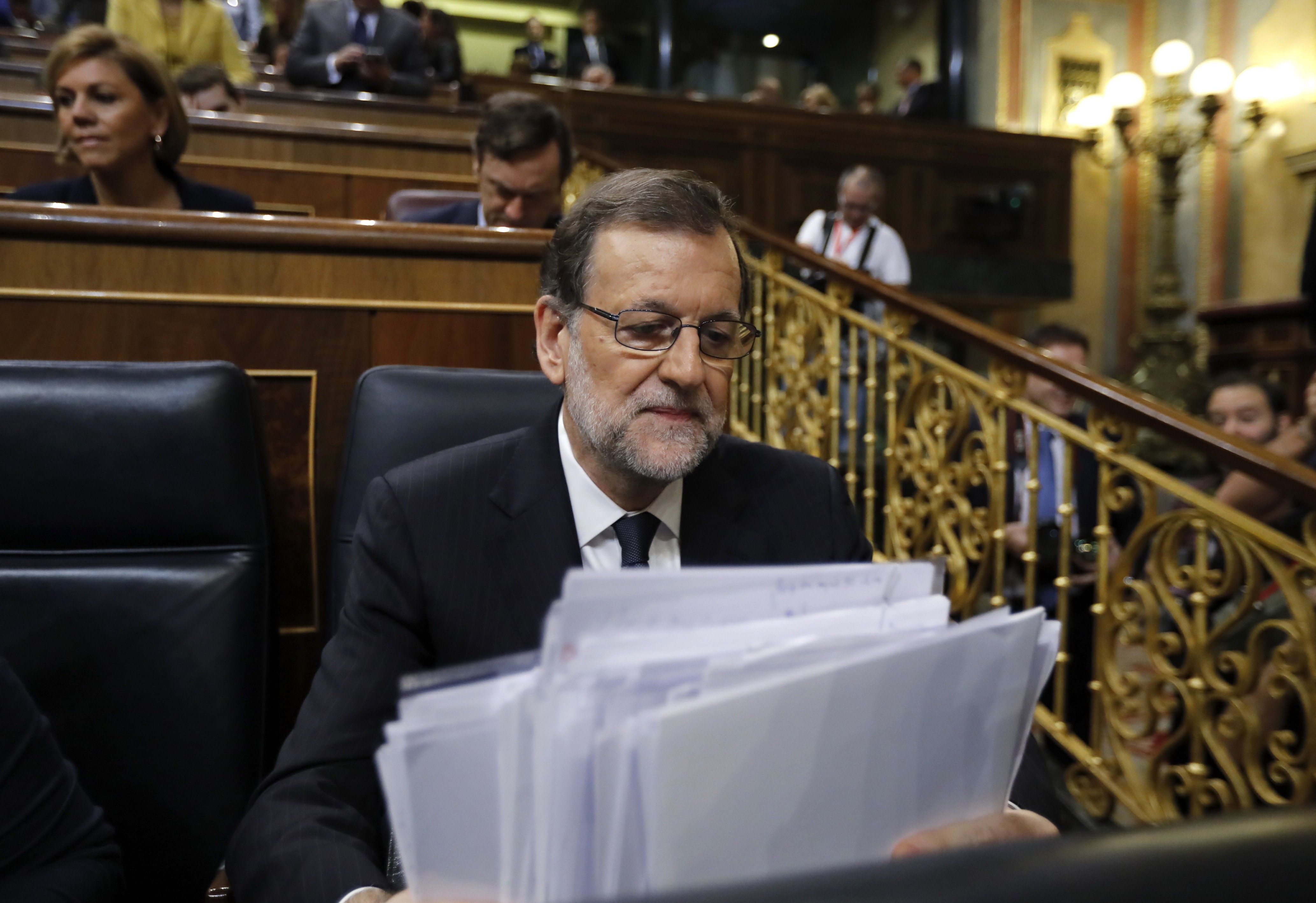Mariano Rajoy will become the first Spanish Prime Minister to sit before a judge and declare as a witness this Wednesday for a corruption case, the Gürtel, leaving a photograph for the annals of politics, and a symbol of the culmination of lights and shadows generated over the years with money from within the heart of the Popular Party (PP).
It will be at 9am at Spain's High Court, the Audiència Nacional in San Fernando de Henares, where Rajoy is expected to be greeted by shouts from the 25-S Coordination group, the architects of other concentrations similar to that scheduled for 9am, such as the Rodea el Congreso ('Surround the Congress'). For this reason, sources close to the PP's leader had been weighing up until a few days days ago that he would assist the hearing alone and without an entourage, and with a clear message: to claim that he dismissed the businessman, Rafael Correa, in 2004 and that he had no involvement in the plot, neither through awarding benefits or receiving illicit money.
"In 2003, Rajoy was not the campaign leader and nor did he have responsibility for the economics of the party. It will simply be a reminder about what he did and what the PP was doing in 2003," said the General Coordinator of the PP, Fernando Martínez Maíllo, at a press conference on Monday. Rajoy will say that he became the leader of the PP the following year, when he decided to do without the services of Correa and his company, which was dedicated to organising events and public awards. Among them, campaigns for the PP in Majadahonda and Pozuelo de Alarcón, which are considered part of this episode of the Gürtel case.
With the unprecedented moment of seeing the head of the government in front of the judge (Felipe González and Adolfo Suárez did it when they were ex-presidents), the PP members have sought to convert the weakness into a virtue. Rajoy fought to distance himself from declaring right up to the end, or at the most, to have to do so only by videoconference. That was the proposal of the president of the court, Ángel Luis Hurtado, who in the opinion of Maíllo was "very well founded". Once the magistrates changed their mind, the message from the PP's headquarters in Génova and from the Prime Minister's Moncloa residence, became one of "maximum collaboration with justice".
Indeed, the General Coordinator of the PP claims he has not seen Rajoy "so calm" for some time. His advisors even circulate a counter-story of international "normality", comparing the case with France, "where it is usual", as revealed by an intimate colleague of the cabinet a few days ago, in an informal conversation. It was rounded off by Maíllo with a long list of names, such as the French politicians, Dominique de Villepin or Lionel Jospin, or the British politician, David Cameron, or the Pole, Donald Tusk.
Nevertheless, the head of the central government will have prepared for his case conscientiously. This same Monday he was absent from the PP's committee of directors, even though sources deny that it was dedicated to these affairs. "Not all agendas are made public," the General Coordinator explained, in the face of the rumours that Rajoy was with his lawyer. What the sources in his confidence do acknowledge is that they have revised the statutes of the party and worked on the arguments together with the President of the Senate, Pío García-Escudero, who was the campaign head in those elections.
At the same time, the PP has already found a scapegoat to charge for the responsibility of the event. Maíllo signalled ADADE (Association of Democrat Lawyers of Europe) as the main architects behind the request of Rajoy's appearance, and accusing the socialists of being behind it. "It's the PSOE (Spanish Socialist Workers' Party) and everybody has to know it," he said, asserting that they were working on the "dictation" of the rival party. They consider, however, that the questions from ADADE will not be the only ones the Prime Minister will receive, and that other lawyers will take advantage of such a mediatic trial. "The minute of glory", ironized the PP sources.
It will be a bitter blow in the Moncloa, coming at a time when the Spanish economy is recovering, growth forecasts have been modified upwards, and everything indicates that the administration could hold power until 2020. That would be the picture they would prefer on the front pages of the newspapers the next day, as well as Thursday being when the employment awards will be given out, and the Active Population Survey (EPA) will be published, predicting a reduction in unemployment. Although the Spanish Prime Minister will also have to be accountable in front of journalists on Friday's press conference for the balance of the year.
But how to counterbalance the image of corruption in Rajoy's testimonial is worrying the PP, and a great deal. "We cannot say everything," said one of his closest colleagues a few days ago, in order not to have to explain what the strategy would be. For now, the feigned optimism reigns above the mediatic costs that the opposition will predictably use to nurture their arguments. "The following day the sun will rise," concluded an intimate colleague of Rajoy, in front of the black clouds descending upon Congress.

